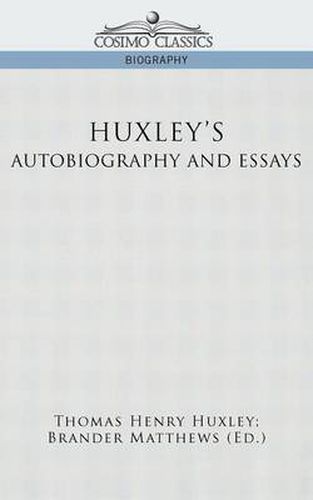Readings Newsletter
Become a Readings Member to make your shopping experience even easier.
Sign in or sign up for free!
You’re not far away from qualifying for FREE standard shipping within Australia
You’ve qualified for FREE standard shipping within Australia
The cart is loading…






This title is printed to order. This book may have been self-published. If so, we cannot guarantee the quality of the content. In the main most books will have gone through the editing process however some may not. We therefore suggest that you be aware of this before ordering this book. If in doubt check either the author or publisher’s details as we are unable to accept any returns unless they are faulty. Please contact us if you have any questions.
As an intellectual giant of the 19th century, Thomas Henry Huxley was a pioneering genius whose influence was felt throughout the worlds of science, education, and politics of Victorian England. A man of astonishing energy and prodigious talent, Huxley had a sharp wit and a brilliant, inquiring mind. What he may have lacked in patience for tedious detail, he more than made up for in insight and intellect. Lovers of intellectual history may recall that Huxley invented the term agnostic to describe his own views. Generations of freethinkers are in his debt, given his codification of the agnostic concept into our language and unchained us from the limited concept of belief vs. disbelief-in and out of narrow religious contexts. This combination autobiography and essay collection, originally published in 1919, includes: . On the Method of Zadig . A Lobster; or the Study of Biology . On a Piece of Chalk . From the Hut to the Pantheon . On the Advisableness of Improving Natural Knowledge . A Liberal Education and Where to Find It . Science and Culture . On Science and Art in Relation to Education, as well as a chronology of Huxley’s life and work. THOMAS HENRY HUXLEY (1825-1895), physiologist, anatomist, anthropologist, agnostic, and educator, is also the author of Evidence on Man’s Place in Nature (1863).
$9.00 standard shipping within Australia
FREE standard shipping within Australia for orders over $100.00
Express & International shipping calculated at checkout
This title is printed to order. This book may have been self-published. If so, we cannot guarantee the quality of the content. In the main most books will have gone through the editing process however some may not. We therefore suggest that you be aware of this before ordering this book. If in doubt check either the author or publisher’s details as we are unable to accept any returns unless they are faulty. Please contact us if you have any questions.
As an intellectual giant of the 19th century, Thomas Henry Huxley was a pioneering genius whose influence was felt throughout the worlds of science, education, and politics of Victorian England. A man of astonishing energy and prodigious talent, Huxley had a sharp wit and a brilliant, inquiring mind. What he may have lacked in patience for tedious detail, he more than made up for in insight and intellect. Lovers of intellectual history may recall that Huxley invented the term agnostic to describe his own views. Generations of freethinkers are in his debt, given his codification of the agnostic concept into our language and unchained us from the limited concept of belief vs. disbelief-in and out of narrow religious contexts. This combination autobiography and essay collection, originally published in 1919, includes: . On the Method of Zadig . A Lobster; or the Study of Biology . On a Piece of Chalk . From the Hut to the Pantheon . On the Advisableness of Improving Natural Knowledge . A Liberal Education and Where to Find It . Science and Culture . On Science and Art in Relation to Education, as well as a chronology of Huxley’s life and work. THOMAS HENRY HUXLEY (1825-1895), physiologist, anatomist, anthropologist, agnostic, and educator, is also the author of Evidence on Man’s Place in Nature (1863).